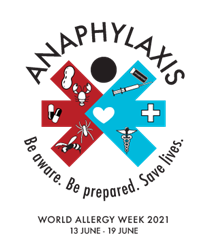
Anaphylaxis does not have to be severe or fatal, if it is identified and treated immediately.
MILWAUKEE (PRWEB)
June 07, 2021
Anaphylaxis, a serious allergic reaction, comes on suddenly and severely after exposure to allergens, most commonly food, drugs, and insect venom, and can be fatal. On June 17, 2021, World Allergy Organization (WAO) experts will discuss anaphylaxis in a webinar for a general audience on June 17.
The webinar entitled, “SToP Anaphylaxis!” will explain the importance of recognizing early signs of anaphylaxis (Spot), knowing the best way to respond (Treat), and understanding ways to minimize risks (Prevent).
- Spot anaphylaxis: Anaphylaxis is an allergic reaction that involves the airway, breathing, or circulation (ABC). Features include asthma-like symptoms, low blood pressure/fainting, and confusion – usually in the context of more typical symptoms of a mild allergic reaction, such as hay fever-like symptoms, itchy skin rash (hives), swelling of the lips or face, abdominal pain or vomiting. Anaphylactic shock is the most severe presentation in which insufficient blood circulates around the body and results in collapse.
- Treat anaphylaxis right away: Immediate injection of intramuscular epinephrine (adrenaline) at the first sign of anaphylaxis, and calling for an ambulance, is the most effective way to treat anaphylaxis. Epinephrine (adrenaline) is available as intramuscular auto-injectors or pre-filled syringes. However, not all parts of the world have access to epinephrine (adrenaline) for patients to keep as rescue medication.
- Prevent anaphylaxis: People at risk of anaphylaxis should work with their allergy/immunology specialist to learn how and when to self-inject epinephrine (adrenaline), as well as develop an emergency plan. They must carry both the medicine and plan with them at all times. Allergen avoidance, improving confidence, talking about anaphylaxis, and sharing emergency plans with others all help in reducing risk.
Webinar faculty will include:
- Margitta Worm, MD, PhD, of Charité-Universitätsmedizin Berlin, Germany
- Victoria Cardona, MD, PhD, of Hospital Universitari Vall d’Hebron, Barcelona, Spain
- Luciana Kase Tanno, MD, PhD, of University Hospital of Montpellier and Desbrest Institute of Epidemiology and Public Health, INSERM, University of Montpellier, France
- Paul Turner, FRCPCH, PhD, of Imperial College London, United Kingdom
- Michael Levin, MD, PhD, of University of Cape Town, South Africa, and
- Motohiro Ebisawa, MD, PhD, of Sagamihara National Hospital, Sagamihara, Japan, WAO President
“Anaphylaxis does not have to be severe or fatal, if it is identified and treated immediately,” according to Professor Motohiro Ebisawa. “We can save lives. Everyone should learn the early signs of anaphylaxis and be able to recognize it and respond right away.”
The webinar will take place from 7:00 to 9:00 A.M. CDT. Click here to calculate local time: https://www.timeanddate.com/worldclock/converter-classic.html. Find more information about the webinar and World Allergy Week at: https://www.worldallergyweek.org.
Note to journalists and physicians: See “World Allergy Organization Anaphylaxis Guidance 2020”, World Allergy Organization Journal 2020;13(10):100472 (30 October). DOI: https://doi.org/10.1016/j.waojou.2020.100472
______________________________________________________________________
About the World Allergy Organization
The World Allergy Organization (WAO) is an international alliance of 104 regional and national allergy, asthma and immunology societies. Through collaboration with its Member Societies WAO provides a wide range of educational and outreach programs, symposia, and lectureships to allergists/immunologists around the world and conducts initiatives related to clinical practice, service provision, and physical training in order to better understand and address the challenges facing allergists/immunologists worldwide. (http://www.worldallergy.org)
Share article on social media or email:

